
BSc (Hons) Paramedic Science
Launch your career in paramedic science with our practice-led course, which teaches you everything you need to succeed in emergency and urgent care environments.
-
Typical offer: 112 – 120
Entry requirements -
Fees: £9,535 per year (UK)
Full details -
UCAS code: B780
-
Course length: three years
Find out more -
Location:
- University of Hertfordshire, Hatfield
-
Institute code: H36
The Janice Ann McNaughton Bursary
£3,000 (paid in the first year of study) is awarded every year to two first year students studying on this course. Students are eligible to apply if they are care-leavers or care-experienced students aged 18-24. If the cohort does not include two students who meet the above criteria, students under the age of 25 who are the first in their family to attend university may be considered. Applicants must fill in a short application form.
Find out more about scholarships, grants and bursaries
Find out moreNHS Learning Support Fund
- Training grants of at least £5,000 a year are available for eligible healthcare students which you will not have to pay back.
- You may also be eligible for an additional £2,000 towards childcare costs to help balance your studies with family life and £3,000 for students who find themselves in unforeseen financial hardship.
Course overview
If you are caring, resilient, and possess strong communication skills along with the ability to make decisions calmly, then paramedic science is the ideal course for you. This paramedic course prepares you to serve as the first point of contact for individuals during their most vulnerable moments.
You’ll graduate with all the knowledge and skills required as a paramedic. Many of our graduates continue their education to become specialist or advanced paramedics, while others advance to senior positions within the NHS. You’ll have the opportunity to join our alumni who are actively involved in the professional body, the College of paramedics, contributing to the advancement of the paramedic profession.
By studying a paramedic degree, you will join a global community of paramedics who are dedicated to caring for patients every day of the year.
Why choose this course?
Studying paramedic science at Herts opens the door to a rewarding career.
Become industry qualified: immediately upon graduation, you will become eligible for registration with the Health and Care Professions Council (HCPC), meaning you will be fully qualified as a paramedic as soon as you leave us.
Strong employment prospects: 98% of Herts health and social care graduates are in work or further study 15 months after graduation (Graduate Outcomes, 2021/22).
Undertake work placements and gain industry experience: throughout your paramedic course, you will have the opportunity to undertake placements with either the London Ambulance Service NHS Trust (LAS) or the East of England Ambulance Service NHS Trust (EEAST). When you’re not on placement, you’ll practice in our simulation areas, utilising innovative technologies to create an immersive experience that helps you develop and enhance your clinical and communication skills.
Professional accreditations
Health and Care Professions Council
The BSc Paramedic Science course is endorsed by the College of Paramedics and once graduated, you will be eligible to apply for registration with the Health and Care Professions Council as a qualified paramedic. Throughout the programme, you will study alongside other undergraduate healthcare professionals, which will deepen your understanding of common areas of healthcare delivery.
Your future career
An impressive 98% of Herts health and social care graduates are in work or further study 15 months after graduation (Graduate Outcomes, 2021/22).
Typical areas of work for paramedic science graduates include:
- paramedic
- specialist (focus in specific area)
- air ambulance paramedic
- forensic paramedic
- minor injury clinic specialist
- military paramedic
Most of our graduates take up positions as Newly Qualified paramedics within an NHS Ambulance Service. However, there are also employment opportunities with other NHS Trusts and the private sector. With suitable experience you can specialise in urgent or critical care, research, management or education. You can also consider postgraduate study at masters or doctoral level.
See what recent graduates are up to
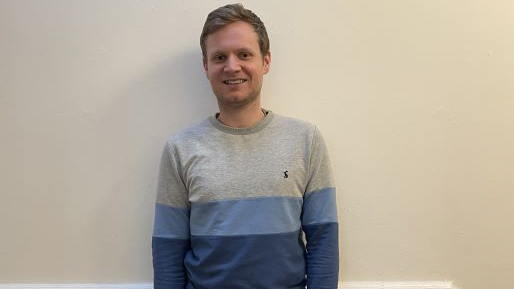
James Wilkinson
Paramedic at London Ambulance Service
An emergency responder
Since graduating with his BSc (Hons) James has worked for London Ambulance Service. As a newly qualified paramedic, James was one of the first responders to a terrorist attack on Westminster Bridge in London. James says, “I saw first-hand the impact of effective teamwork. Working together with other emergency services and NHS professionals we were able to save lives. The event also highlighted to me the importance of respecting people’s mental health, and I would encourage others to talk about issues that arise in their professional career.” James’ bravery and professionalism have been widely recognised by his NHS colleagues, the London Ambulance Service, and Downing Street.
Sharing knowledge with students
James really enjoys sharing his clinical knowledge with others. He says, “my excellent academic experience at Herts has enabled me to support current Herts students who undertake their placements with the London Ambulance Service. I am also a Clinical Lecturer at the University of Cumbria. I aim to build upon and strengthen the foundations of undergraduate education to benefit the next generation of paramedic students.”
Improving patient care through further study
James is passionate about lifelong learning. He says, “my plan is to advance my career into Critical Care as an Advanced Paramedic. I have come back to Herts to study for my MSc, and I will also look at progressing on to PhD level and beyond, working on improving patient care. I have found the further study so interesting and beneficial to my work and own personal understanding of different fields.”
Life at Herts
James initially opted to study at Herts because the placement opportunities were really enticing, and he joined a campus applicant day to find out more. He says, “I absolutely loved the look, feel and friendliness of the university! This positive experience fed through my undergraduate years and into my postgraduate study. I have found the module content on my course extremely interesting and very relevant to practice.”
James’ favourite memory from first joining Herts is from Freshers’ week. He says, “it was a great opportunity to socialise with other students from both my own cohort and other courses. I remember a huge karaoke night, a surprise concert from Tinie Tempah, and a collection of great artists in the Forum.”
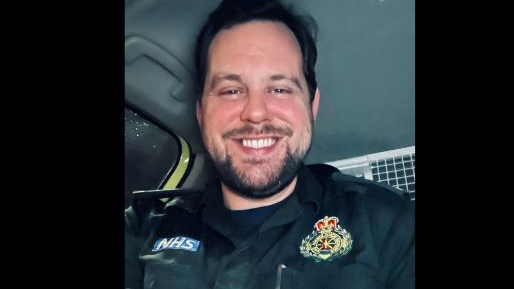
Sean Cloak
Paramedic at London Ambulance Service
A supportive learning environment
Sean has recently returned to clinical practice, working full time as an operational paramedic with the London Ambulance Service and works on a Fast Response Vehicle (FRV) based out of Becontree Ambulance Station. He is also a Visiting Lecturer for the Paramedic Science team at Herts. Sean says, ‘the University of Hertfordshire is incredibly fortunate to have highly professional and talented lecturing staff who ultimately then became colleagues of mine when I joined the team as a Senior Lecturer. These individuals have shaped my career and still do today by supporting and guiding me in my development.’
Sean applied to various universities offering Paramedic Science around the country, but Herts ultimately became his first choice for two reasons, ‘It was one of the first university's to successfully deliver a paramedic degree and it was partnered with the London Ambulance Service. It was also the reputation of the University and the long-standing history of the course itself.’
A hands-on course
Although the Paramedic Science course has changed over the years, Sean’s favourite aspect of his course whilst he was at Herts, was the split nature of it between employment for the London Ambulance Service and university study. Sean qualified as an EMT (emergency medical technician) in his first year after undergoing operational training with the ambulance service. For his remaining two years of study, he worked for the London Ambulance Service whilst studying for his degree. Sean says ‘this provided me with a perfect balance of theory and practical based learning. I also got a wage from working which helped me as a student.’
Friends for life
The most memorable part of Sean’s student experience was the friends he made. He says, ‘the friends that I made from my course when I was a student over 10 years ago now are still my closest, we are all still in contact, we are all married and have our own children now and we are all still working within the ambulance and pre-hospital sector.’
The future
‘My next achievement would be to finally do an MSc, but for now my focus is on watching and being present for my 2 young children as they grow up.’
What you'll study
Throughout this full-time, three-year paramedic science degree, you will benefit from a combination of theoretical and practical experience.
In your first year, you’ll learn about human anatomy and physiology, exploring the components of the human body and how they function together. You’ll also be introduced to behavioural and social issues that you might encounter when working, as well as how to assess and manage all types of accidents and illnesses. That’s the theory side of things. As practical experience is so important, you’ll be out on placement from your first year of study. This placement is aimed at getting you used to the clinical environment and to develop excellent communication skills.
In your second year, you will learn more about patient assessment. By now you will already know what a normal healthy body looks like. In this year, you will learn what can go wrong, how to identify it and most importantly, what to do about it. You will work in clinical settings under the supervision of fully qualified health professionals. You’ll study the latest research and evidence, to ensure your practice is in line with the most recent developments in the field. You will also learn about the legal and ethical considerations of the profession.
In your third year, you will delve deeper into the foundations of level 4 and 5. You’ll learn about clinical pharmacology, which combines bioscience and pathophysiological knowledge – or in plain English, the knowledge of physical processes that occur with disease or injury. This year emphasises ethical practice, taking all factors into consideration. You’ll learn to reflect on the effects of your choices on the patients and their loved ones. And of course, more placements until you are ready to go out on your own.
What if I need support?
You’ll have a personal tutor to guide you throughout your course, all the way to graduation. If you need additional support during your time with us, rest assured that we’ve got you covered. For help with study skills, including referencing, essay writing and presentations, you’ll have access to our academic support services. You can attend workshops, 1-to-1 sessions and online tutorials. Both our LRCs run drop-in study skills sessions. And the best thing is, it’s all free.
Where you'll study
Your main campus is College Lane, this is where the creative arts, science and health-related subjects are based. This means you’ll share the campus with future nurses, scientists, artists and more. You can use the common rooms to relax with friends, work out in the 24-hour gym or have a drink in our on-campus bar. We also have restaurants for you to eat in or grab something on the go. Our Learning Resources Centres are open 24/7, which means you can study whenever suits you best. Want to pop over to the other campus? You can take the free shuttle bus or walk there in just 15 minutes.
Who you'll learn from
Your teachers include doctoral staff and paramedic industry experts who will impart their knowledge and experiences. The teaching approach emphases proactive learning, drawing from real-life experiences and scenarios shared by your tutors and alumni as well as your placement experiences.
Additionally, you have access to an academic support team, a well-being team, and a personal tutor who will help you navigate university learning and living.
Working together, your teaching and support team is committed to assisting you in realising and achieving your full potential.
Check out our student blogs
How we support our students
At the University of Hertfordshire, we want to make sure your time studying with us is as stress-free and rewarding as possible.
We offer a range of support services, from childcare to counselling, ensuring that you make the most of your time at Herts and can focus on studying, having fun, and have the support you need.
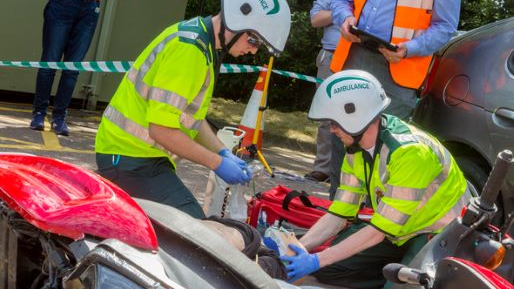
Student Blogs
Cameron - Typical day on Placement
A typical day on placement: Paramedic Science
The placement by far is the best part of any health course. It’s a look into the career you work so hard to achieve. This is a look into a 12-hour shift I undertook, starting at 06:00.
I wake up at 04:30, make some breakfast and put my food for the day in my bag then set off. I aim to set off at about 05:00. About 30 to 45 minutes later, I arrive at the station. The first thing I do is make a pot of coffee, sort out my bags and equipment then go to the ambulance. I then check the ambulance to make sure everything is working mechanically and make sure that we have all the equipment we need. Usually, my crew have arrived by now, taken out the medication and helped load equipment onto the ambulance. We aim to be ready to start by 06:10.
We normally get the first job once we become available. The jobs that we usually receive range from chest pains to minor injuries, to falls and social emergencies. When people say that the ambulance goes to everything and anything, it’s an understatement. You meet hundreds of different people with different ways of life, different views on the world and interesting life stories. Some people are having a minor emergency, where things work slower and more calmly and some are having a major emergency, where quick decisions make all the difference to someone’s outcome. Some patients you can leave at home with advice or you may refer some to their GP. Each job is different and can have wildly different outcomes.
With each patient, you get a lot of power to do assessments and make decisions. Generally, you make most of the decisions and treatment plans and procedures within your scope. There is, however, a slight caveat. Much like a rollercoaster gives you the feeling of danger while you are relatively safe, your mentor is watching everything you do, and will overrule any decision you make if it goes against their plan of action. It’s a strange sense of freedom and safety. A good mentor will give you enough room to make mistakes, but not enough to cause harm by doing so.
The amount of responsibilities you have in each ambulance varies by the crew. Some will ask you to do all the monitoring, some will ask you to attend each patient (attending a patient is taking the responsibility for the outcome and doing the paperwork). It varies by who you work with at any given time.
An average day will have five to seven patients, each with varying levels of sickness. The days are long but go by quickly as you are always busy. Breaks are a rarity on ambulances, you eat your food on the way to patients. Although the average “job time” is an hour and a half, it can be much longer depending on the situation. I think my personal longest is five to six hours, although there are others with much longer times.
At the end of the day, you return to the station, empty out the truck and go home. It’s quite a quick process depending on how much you have. Once back home I make food for the next day, defrost some dinner I made earlier in the week, eat, shower, sleep and repeat.
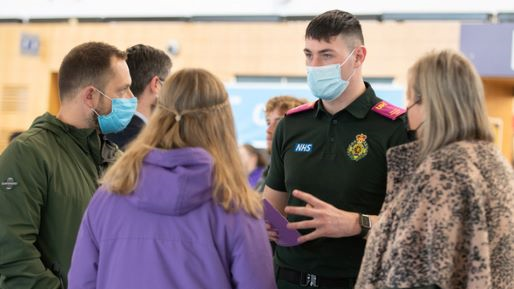
Student Blogs
Cameron - Things you should know
Things you need to know before studying Paramedic Science at Herts
Anyone applying to this course, as with most healthcare professional courses, is very much aware of the career they are looking to start, which is a blessing of sorts. These are just a few things I think people should know whilst consider a career as a health care professional.
Since its recognition as a profession in the 1990s, to the “Paramedic Evidence Based Education Project” in 2013, it has become more obvious that paramedics are moving rapidly into being an evidence-based healthcare profession. This means that our practice is constantly changing as evidence finds more effective practices or removes less-effective practices. Gone are the days of “scoop and shoot,” and here are the days of treating patients, leaving the ambulance services and being a key part of emergency medicine. When I started this degree, I didn’t understand the true nature of the role as I do now. It's far more complicated than I first thought, and it is more obvious than ever that a degree is what is needed to understand the profession as it changes.
Another thing that needs considering is the range of careers available. In times gone by, paramedics just worked on ambulances. Now, you can find them in all corners of healthcare, ranging from GP surgeries to A+E, to oil rigs and cruise ships. #notallparamedicsweargreen was started to highlight this, and I highly encourage all interested in this course to look it up.
The course itself is a strange beast unto itself. The two main theoretical components are the science elements and patient assessment and management. Whilst the other aspects of the course can feel a little bit less relevant, you realise their usefulness in practice very quickly. Whilst elements of law may feel distant, when you are faced with complex medico-legal situations, you will thank the lucky stars you paid attention in that lecture.
Another aspect of the course to consider is your time learning. Unlike in some courses, everything you learn you will have to put into practice soon, so it’s well worth your time learning both the general paramedic theory, as well as trust specific protocols for placement. Knowing these makes you far more useful to the crew your put with on placement.
A final misconception I personally had before I personally had was that the medical knowledge wouldn’t be as advanced as it is. What we cover is quite advanced medical concepts, more so than I had expected, so be prepared for the science to get intense, very quickly.
Another beast is placement. Placement is the best part of the year by all measures. Its where you practice all the elements you have learned in theory and have the single best look into your future career. That doesn’t mean it’s not a challenging time though. Firstly, the logistics of getting to stations 20 miles away at 06:00 in the morning is hard on its own, especially if you don’t have your own transportation. Secondly, you are fully exposed to whatever the crew goes to. Car crashes, stabbings, mental health patients, you see it all. Thankfully, serious jobs aren’t an everyday occurrence for most, but they do happen. There’s nothing stopping you going to deceased patients in your first week. Thankfully, there is so much support, both from the trust and the university, as well as your mentors. Finally, placement is exhausting after a while. 12-hour shifts at odd times, night shifts, a constant inflow of patients. There’s no getting around the fact you are under a lot of stress over the course of the month.
There is a lot of stuff about the course and placement that I wish I could tell you about, but then this wouldn’t be a blog, rather a book. At the end of the day, paramedic science and the career it leads you to is at times tough but highly rewarding.
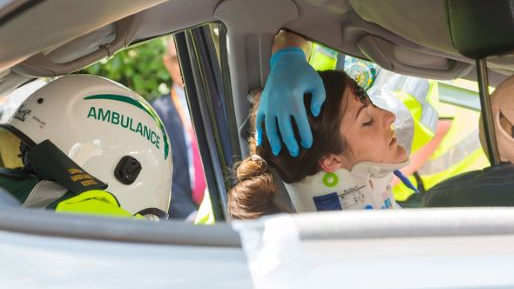
Student Blogs
Courtney - Typical day on placement
A typical day on placement: Paramedic Science
While studying Paramedic Science at UH, you will have placement blocks throughout the course, with each block around 4-5 weeks long. Many people feel anxious or nervous about starting their placements, especially their first placement, but let me reassure you that this feeling is completely natural and there is absolutely nothing to worry about. You will have an assigned mentor on each of your placements who will support you and help you progress.
My first placement in year 1 was on NETS (Non-Emergency Transport Service) with London Ambulance Service where I assisted in taking basic observations such as a heart rate and respiratory rate. NETS crews are sent out to patients who are not seriously ill or injured. I found that this was a nice way to be eased into placement as several people are worried that they will be thrown in the deep end and be immediately faced with critically ill patients.
From the second placement block onwards, you will be working on emergency ambulances where you will get sent out to patients who are ill and require medical attention. Shifts will be a mixture of days, nights, earlies, lates and weekends, and this is a good way to prepare yourself for what the shift pattern would be like once employed by the ambulance service. For these placements I was based at ambulance stations within the Edmonton Complex in North London. For me, the placements were the best part of the course, as it gave me the opportunity to have hands on experience and your mentor encourages you to get involved as much as possible. This gives you a chance to put what you have learned at university into practice and apply your knowledge to a variety of situations.
I got along very well with all the mentors I’ve worked with since year 1, and I felt comfortable asking questions about topics or situations that I wasn’t sure about or was lacking confidence in. After a job was completed, my mentor and I had a chat about the job and discussed things that went well and things that I found difficult or wanted to know more about. This was helpful as it made my mentor aware of my strengths and areas that I needed more confidence and practice in, and this helped me progress throughout the years. Being on the frontline treating patients and seeing an improvement in their condition is such a rewarding feeling, and the rewards by far outweigh the challenges of the job. There might be some jobs that you go to during your placement which are particularly upsetting or distressing but there are services available to support you, both through the university and the ambulance service.
Entry requirements
The University of Hertfordshire is committed to welcoming students with a wide range of qualifications and levels of experience. The entry requirements listed on the course pages provide a guide to the minimum level of qualifications needed to study each course. However, we have a flexible approach to admissions and each application will be considered on an individual basis.
| Typical offer (UCAS points) | (enter tariff range) |
|---|---|
| Typical A Level offer | (enter range) |
| Typical IB offer | (enter range) |
| Typical BTEC offer | (enter range) |
| Typical T Level offer | (enter range) |
| GCSE | EG: Grade 4/C in English Language and 4/D Mathematics |
| Access courses | EG: An overall merit profile in 45 credits at Level 3. |
| Additional information | Find out more about our standard and contextual Undergraduate Entry Requirements. |
| English language | All students from non-majority English speaking countries require proof of English language proficiency, equivalent to an overall IELTS score of 6.0 with a minimum of 5.5 in each band. If you do not have the required IELTS or equivalent for direct entry on to your degree programme, our Pre-sessional English and International Foundation courses can help you to achieve this level. |
|---|---|
| Additional information | Find out more about International Entry Requirements. |
| Typical offer (UCAS points) | 112–120 |
|---|---|
| Typical A Level offer | BBC–BBB Mandatory subjects: B in a natural or physical science (Biology; Chemistry; Physics; Psychology; Sociology; Physical Education (PE). |
| Typical IB offer | 112–120 |
| Typical BTEC offer | DMM–DDM Mandatory subjects: BTEC Level 3 National Extended Diploma - must achieve DMM–DDM in Applied Science. Other science BTECs will be considered (e.g. sports & exercise science). BTEC Level 3 National Extended Diploma in Health and Social Care - must achieve DMM–DDM, with D in Anatomy and Physiology for Health and Social Care (A&P) Unit. A combination of A levels and BTECs will be considered. |
| Typical T Level offer | Healthcare Science (minimum of merit with grade B required in core component); Health (minimum of merit with grade B required in core component); Science (minimum of merit with grade B required in core component). |
| GCSE | Grade 4/C in English Language, Mathematics and Science. Science GCSE is not necessary if taking Access. |
| Access courses | 112–120 points from 45 credits at Level 3. Must be in science or medicine/nursing/allied health subject |
| Additional information | All applicants will be subject to fraud and Enhanced Disclosure and Barring Service (DBS) checks and Occupational Health (OH) Screening on commencement of the programme. As part of the application process, you will be required to have a face-to-face interview. This will help us decide about your suitability for becoming a student paramedic. If you are invited to interview, you need to be prepared to show us you have the potential to become a successful student. We will be assessing how you meet the Values of the NHS Constitution; your insight into the paramedic profession; and your commitment to becoming a paramedic student. Find out more about our Undergraduate Entry Requirements. |
| English language | All students from non-majority English speaking countries require proof of English language proficiency, equivalent to an overall IELTS score of 7.0 with a minimum of 6.5 in each band. If you do not have the required IELTS or equivalent for direct entry on to your degree programme, our Pre-sessional English and International Foundation courses can help you to achieve this level. |
|---|---|
| Additional information | Find out more about International Entry Requirements. |
Ready to apply?
UK and EU applicants with pre-settled/settled status in the UK
| Start date | Study type | Apply |
|---|---|---|
| September 2025 | Full time - year 1 | Apply via UCAS |
| Full time - year 2 | Apply via UCAS | |
| Full time - year 3 | Apply via UCAS | |
| September 2026 | Full time - year 1 | Apply via UCAS |
| Full time - year 2 | Apply via UCAS | |
| Full time - year 3 | Apply via UCAS |
International and EU applicants without pre-settled status in the UK
Fees and funding
At Herts, we’re dedicated to providing world-class teaching supported by industry-level facilities and incredible social spaces. We believe cost shouldn’t be a barrier to higher education, and we strive to keep both our standard and additional costs as low as possible.
| Study type | Fees | |
|---|---|---|
| UK students | Full time | £9,535 for the 2025/2026 academic year |
| EU students | Full time | £15,965 for the 2025/2026 academic year |
| International students | Full time | £15,965 for the 2025/2026 academic year |
Tuition fees are charged annually. The fees quoted above are for the specified year(s) only. Fees may be higher in future years, for both new and continuing students. Please see the University’s Fees and Finance Policy (and in particular the section headed “When tuition fees change”), for further information about when and by how much the University may increase its fees for future years.
| Scholarships, grants and bursaries | Depending on your circumstances, you may be eligible for a non-repayable scholarship, grant or bursary to support your studies. |
|---|---|
| Disabled Students' Allowance | The Disabled Students’ Allowance can cover any study-related costs you have because of a mental health problem, long term illness or any other disability. |
| Student loans | Find out about securing a student loan, from how much you could be eligible for to when you need to start making repayments. |
| Accommodation costs | We offer a great choice of student accommodation, on campus or nearby in the local area, to suit every student budget. |
| Additional course fees | Placement travel (average) depends where accommodation is situated £400. Read more about additional fees in the course fact sheet. |
More about the course
| Course fact sheets | |
|---|---|
| BSc (Hons) Paramedic Science | Download PDF |
| Programme specifications | |
|---|---|
| BSc (Hons) Paramedic Science | Download PDF |
| Additional information | |
|---|---|
|
Applications open to international and EU students |
Yes |
Course length |
Full Time, 3 Years |


